
BLOG
Does your business need a blog? Depends on what you need from your business
Sovereign Standard, Issue 16 I’m a frugal lass. I squeeze the toothpaste tube for a week longer than any sane person would and I still manage to have fresh breath.
I’m a frugal lass. I squeeze the toothpaste tube for a week longer than any sane person would and I still manage to have fresh breath.
If there’s still some meaning to be eked out of a revelation like “I gotta quit entrepreneurship,” I’m going to find it. I’m obligated to find it. (Yeah, I get that this can be obsessive, exhausting, and self-defeating.)
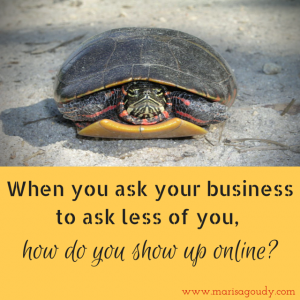 Then I’m going to spend a few hours crafting it into words. And then I am going to share it with my readers - even if the article doesn’t take me one inch closer to attracting copywriting clients or further my creative projects.
Then I’m going to spend a few hours crafting it into words. And then I am going to share it with my readers - even if the article doesn’t take me one inch closer to attracting copywriting clients or further my creative projects.
Blindness? Egomania? Fear of missing out?
Can we call it dedication? I’ve found a tribe who, like me, is feeling the crush of creative entrepreneurship and the idea just won’t leave me alone.
You’re downshifting from entrepreneurship into freelancing. It’s time to do the work that immediate rather than pioneering a visionary program or building a firm (at least for now).
Living and working like the creative-in-business you want to be may mean adjusting how you do business by offering the basic, 'useful' services.
This is why I am shifting my attention to offering the right people my copywriting and editing services while the 'real' creative work gestates in the dark for a while.
Read the rest of Burned Out? Maybe It’s Time to Split the Creative from the Professional
When it comes down to it, “don’t waste anything!” probably isn’t a good enough reason to keep writing about a concept that may or may not be aligned with personal and professional goals.
So I ask myself (in the way I know best - a piece of writing I intend to publish) do I even need to keep blogging and sending out the Sovereign Standard if I’m redefining my relationship to my business?
As you ask your business to ask less of you, how will you show up online?
So, what if you are called to make a shift in how you relate to your business?
Tons of your behind the scenes habits and attitudes will change, but the hardest changes you make will relate to how you decide to show up online.
You know you still have to think about your visibility, consistency, and reputation. Even if you're happily shutting down a larger company, with creative dreams like yours, there's going to be a time when you want an audience who knows and loves you.
Over-hyped as it may seem, content marketing is key to building a business in 2015. It's key to building a creative platform as well. We hear about “the importance of creating compelling content, of all lengths, and across all platforms” from countless sources. Everybody’s doing it and if you’re serious about building a business or a platform as an author or thought leader, you have to do it too.
(Wait, is that really true?)
Not surprisingly, I do think writing is important - even essential. But, you don't blog because "they" say you must or because you think it's fun compete against mega stars and companies with mega budgets as everyone vie for the web surfers' finite attention.
You create written content because it supports your personal, professional, and creative growth. Ultimately, you need to establish a writing practice that gives back to you.
Must you write for your business (even if you’re scaling it back)?
You've got so much going on. You just want a break. The point is to devote creative energy to the work that matters, not to the marketing and the ephemeral blog posts...
Can you just quit?
As with most answers to important questions, there is no one single “should” when it comes to deciding how you’ll figure out how to show up after you change the rules to your own professional game.
Instead, there are just more questions. This is what I'm asking myself as I restructure my relationship with my work.
How do you write for a changed business? The practical marketing questions
- Do I have enough contacts and other resources to pull in the clients I need without doing my own content marketing?
- What do I blog about now that I am running a more “low key” business that’s built on my scale, not to be scalable?
- Do the clients who hire a smart, competent freelancer want something different than clients who are investing with a creative entrepreneur?
Pause. Here's an answer to those last two questions: Remember that clients don’t really care about what you call yourself as long as you get the work done. And readers don’t care either as long as you’re interesting and helpful.
A new opportunity to prioritize writing for business (or not) and to honor your creativity no matter what
Yes, no, maybe? Business writing is time consuming enough without adding the pressure of an existential blogging crisis on top of it all. Let's cut through the deliberation and establish what's most important:
If you still have to earn a livelihood as a self-employed person, you fundamentally need to focus on the income-generating activities that will sustain you today, tomorrow, and in the near future.
And, if you want to be the person you know you're mean to be you also need to honor and creative acts will nourish you today, tomorrow, and in the near future.
To that end, I'm going to ask myself these three questions before I sit down to write another word on any project.
- Am I writing this for myself and/or to further my creative vision?
- Am I writing this to win real business?
- Am I writing this because part of me has been trained to equate “likes” and spikes in my site stats with approval?
Tell me, what other questions do you ask yourself as you decide how to spend your precious writing time. And if you have any answers? Glory, glory, they're more than welcome too!
Burned Out? Maybe It's Time to Split the Creative from the Professional
Sovereign Standard, Issue 16
Well, that was unexpected: entrepreneurship = a soul crushing experience
 So many working artists and self-employed creatives are feeling the crush of entrepreneurship. It’s not the long hours or even the uncertainty that gets them. It’s the assumption that the goal has to be "build something bigger than you." They're told that success equals developing something that scales and sells.
So many working artists and self-employed creatives are feeling the crush of entrepreneurship. It’s not the long hours or even the uncertainty that gets them. It’s the assumption that the goal has to be "build something bigger than you." They're told that success equals developing something that scales and sells.
Why have so many impassioned, independent souls got caught up in “make it bigger” even though that set them up for the dreaded “not enough” trap?
Because we mixed our creative passions with the reality of making a living. Instead of realizing a holistic vision of create-work-live, we've brewed up an unpalatable concoction that just isn't nourishing and definitely isn't sustainable.
Trying to make one sweeping entrepreneurial venture hold the creative dreams and the professional drive left them with too little time to create, too little in the bank account, and stuck in a chronic state of “not-enoughness.”
Oh, am I slipping into collective nouns here? I’m daring to speak for others on this because so many readers - lets be specific: so many women business artists* - responded to my latest post, Nutella on a Spoon (Or, Why Entrepreneurship Can Leave You Starving).
We are sick of trying to get the mix just right. We're too tired to contort ourselves to fit into the entrepreneurial container.
What creative women in business want
We want freedom of creative expression and the power to earn an independent livelihood.
We want to make something that matters and we want to make some money.
Here's the kicker: we're mature enough to recognize that we won't always be doing both things at the same exact time.
For some, "what you want" may really mean being an entrepreneur and building a company (particularly if you’ve got a gift for sales). On the other hand, it may mean freelancing. It may mean getting a J-O-B in order to recoup the emotional and mental energy that went into being in business for yourself.
Living and working like the creative-in-business you want to be may simply mean adjusting how you do business by offering the basic, “useful” services.
You’re downshifting from entrepreneurship into freelancing. It’s time to do the work that immediate rather than pioneering a visionary program or building a firm (at least for now).
This is why I am shifting my attention to offering the right people my copywriting services while the “real” work gestates in the dark for a while.
In any case, it's about looking closely at what's working and what isn't working and making decisions for the future based on what really matters - personal relationships, creative practice, and earning a living.
When “I quit entrepreneurship” doesn’t really mean “I quit business!” or "I reject my passion!"
Things haven't been working for you? Maybe it's time for the “I quit!” epiphany. It feels so liberating to smash those glass walls and peel back those labels that were hiding who you really are.
But what if the “I quit!” breakthrough doesn’t really mean you’re collapsing your stall in the marketplace? What if abandoning entrepreneurship doesn’t mean you’re taking a vow of poverty or trying to remember how to draft a resume?
What if "I quit creative entrepreneurship" simply means that you're no longer forcing creativity to grow in the same container as the work you do for money?
You might be like Jennifer Boykin who boldly declared she’s quitting her Life After Tampons project. Really, it seems she’s rebirthing her relationship with her creation and finding a way to detangle her passion work from her purse strings.
The Wild and Wise Women Over 45 who love Jennifer's work will not see her as quitter even as she frees herself from the chore of building a business venture that didn't serve her. She's still going to show up, but she's not going to pressure her passion with the needs of her pocketbook.
My "entrepreneurial crisis" has been a personal one. I think Jennifer's was too. Many women are sharing their own stories about why the "e" word doesn't fit and how they're reframing the relationship between the creative work and the paid work.
Is your entrepreneurship problem actually about the relationship between life, art, and work?
My business woes were not about being self-employed. They were about how the “go big” entrepreneurial imperative was squeezing out what really mattered - being present when I was home with my kids, devoting myself to the real creative work, and earning the money to replace the steady income I abandoned five years ago.
Here’s the good news:
If you structured your business based on someone else's definition of success and basic misunderstanding of your own goals, you can readjust your course without tossing away everything you've worked to build.
When you make changes in your business in order to better suit yourself, most people will only notice that you seem happier all of a sudden. (They may also note you're wearing a new pair of shoes because you found a more reliable way to fill the bank account).
Big dreams got you into entrepreneurship. You're leaving entrepreneurship to preserve those dreams.
We know that many wise businesswomen feel trapped by their choice to mix creativity and entrepreneurship. The solution isn’t to abandon either. The answer - at least for me - is to decouple them.
Before you can mediate a peaceful split, however, you have to figure out why you hitched together your creative drive and the promises of entrepreneurship in the first place.
Big creative dreams like yours deserve a big, beautiful container, so you picked the grandest, most promising one you could find: entrepreneurship.
But then you realized that it takes a lot more than vision and passion to build and sustain a business that is bigger than you are. Marketing, staffing, bookkeeping (if you could even get to that level) takes more time and attention that you have right now. Most likely, you got distracted from your original creative dreams because you were scrambling to structure an organization.
What if the work you do for pay doesn’t have to hold all of your creative energies? Suddenly your professional venture doesn’t have to be so big.
Liberating the creative from the professional - at least for a little while - is how you create the right size container for your dreams, your responsibilities, and your financial realities.
This is how novels get written. This is how debt gets paid off. This is how happy women support their families - with love and presence as well as money for groceries and the college savings account.
And saying "no" to entrepreneurship may really be about saying "not right now." It's in the pause, in the freelancing or the day job that the signature approaches that make life more beautiful, bearable, and bold get created: in their own time by creative, practical beings who refuse to see their creative ambitions vanish in entrepreneurial smoke and mirrors.
***
* Deep bow to Jeffrey Davis for bringing the term "business artist" to the fore and for being the community creator who introduced me to so many of the brilliant women who make up my readership. Not convinced that you need to separate the creative from the entrepreneurial? Dive deep into Jeffrey's work, starting with this video - his approach to "business as unusual" may be exactly what you're looking for.
Nutella on a Spoon (Or, Why Entrepreneurship Can Leave You Starving)
Sovereign Standard, Issue 15  Every Thursday afternoon, I found myself at my kitchen island, trying not to get peanut butter and Nutella on my laptop. Mindlessly, I’d swallow spoonfuls of creamy fat as I massaged my weekly newsletter and blog post into a form I deem worthy of the creative entrepreneur.
Every Thursday afternoon, I found myself at my kitchen island, trying not to get peanut butter and Nutella on my laptop. Mindlessly, I’d swallow spoonfuls of creamy fat as I massaged my weekly newsletter and blog post into a form I deem worthy of the creative entrepreneur.
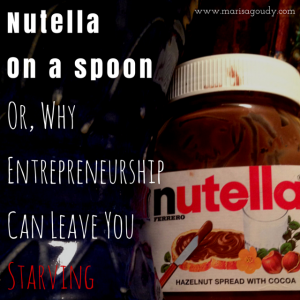 By the time my daughter woke up from her nap in her carseat (I was writing and snacking with half an ear for the thin wail that would come through the propped door to the garage), I would have the post 85% written.
By the time my daughter woke up from her nap in her carseat (I was writing and snacking with half an ear for the thin wail that would come through the propped door to the garage), I would have the post 85% written.
I would also feel 105% awful based on the crap in my stomach. Everything was curdled by the fear that I had wasted another perfectly good naptime on a piece of writing that was derivative or fraudulent. Though I still trust the quality and usefulness of what I produced, something was “off,” but I didn't dare name what it was.
(Yes, I was being hard on myself and yes, I would be incensed if any of my dear readers with their own business writing goals treated themselves so poorly.)
But I pushed on through indigestion and negativity and managed to click send on that email so it reached the Sovereign Standard audience by 11:35 AM ET on Friday.
I did this fourteen times. (Ok, so I published fourteen newsletters… my jeans still fit, so some weeks I must’ve satisfied myself with a cup of tea while I typed.)
I am pretty darn sure I am not going to do it anymore.
Why Entrepreneurship Is the Wrong Shaped Container
It’s spring. Our food, even if it’s imported from way too far away, seems to have a new vibrancy to it.
I want to be eating out of wide salad bowls. It’s time to start drinking from one of those smoothie cups that fall out of the cabinet every damn time I open it. I’m sick of sneaking into the pantry and stretching to reach the jar of goo that I stash behind the tarnished champagne bucket.
Yes, I’m done with palm oil and I am done with contorting myself into the shape of an entrepreneur just because it’s what I declared I would do when I quit my job five years ago.
Here’s the quick history of my entrepreneurship:
When I returned to work after my first daughter’s birth, I knew I had to get out of the windowless office where I spent my 9 - 5. Seven months later, my mom died of a totally unexpected heart attack. I gave my notice and declared I was starting my own business.
Five years on and now a mama to two, I am still straining to find the joy as a mother, a lover, a creative, AND the president Marisa Goudy Inc. (What is that, even?)
“An Entrepreneur Can Sell Anything” (Oh, Crap!)
This discomfort with “I’m an entrepreneur” has been around since the moment I took up the title, but it finally crystallized thanks to a conversation I had with Molly Morrissey, Traditional Astrologer and Vision Consultant.
As she put it, there are some people who are able to sell anything.
They’re not necessary unethical. They’re just able to see a need in the marketplace and craft the exact solution to make those people happy to pay them. (She mentioned something about a guy who sharpens pencils for a living.)
Molly inspired me to reconnect to what I already knew about myself:
I am a writer first. And a salesperson… never. At least not in a way that made me feel nourished and content.
Even as I’ve celebrated and explored creative entrepreneurship on this blog and with my clients, I’ve been haunted by my own late night kitchen breakdowns about never being enough. Most of the time, it has been impossible to be the mother, lover, and creative I wanted to be… not when my belly was full of leaden entrepreneurial dreams.
There’s so much about life that is bloody perfect, and for that I am grateful, but I just can’t keep relying on a sugar high to fuel my professional body of work.
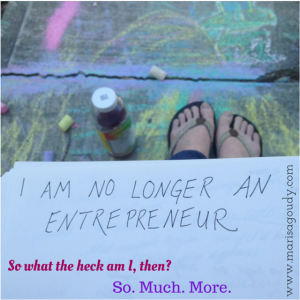 Two key things I just realized about my entrepreneurial journey:
Two key things I just realized about my entrepreneurial journey:
- I’m intensely grateful that the silver lining to the worst event in my life was leaving a job I hated
- I’m intensely crazy to think that I need to stick with a decision that was made in the midst of soul shattering grief
I think entrepreneurs are the awesome engines of our economy and I love ‘em. There so much I get about them. I still want to support them and work with them.
I'm just not so sure I'm supposed to be one.
Entrepreneur Versus Freelancer (Eek, does it have to be so divisive?)
Somebody once told me that it’d take as much effort to build a $50K hours-for-money business as it would to build a $500K+ firm. Armed with that “wisdom” (though really, let’s call it BS), as an overachiever who’d declared her destiny, I was obligated to create something bigger than myself.
After five years, I finally know that I have been feeding myself from the wrong source. And I am bound to starve eventually.
Not only is entrepreneurship about building something bigger than yourself, it’s about devising ways to make money while you sleep, building something investable and scaleable and sellable, and supporting a staff.
I’m able to pull that definition straight from memory, but a good writer researches (or starts Googling stuff she already knows as an act of procrastination) and I found this seven year old blog post from Seth Godin:
The goal of a freelancer is to have a steady job with no boss, to do great work, to gradually increase demand so that the hourly wage goes up and the quality of gigs goes up too.
The goal of the entrepreneur is to sell out for a lot of money, or to build a long-term profit machine that is steady, stable and not particularly risky to run.
In my heart, all I was ever aiming for was that life of a freelancer… I wanted freedom, steadiness, greatness, and quality. “Selling out for a lot of money” sounds nice... for other people.
The Courage to “Just” Be Free to Work in the Sweet Spot
There are a million people who’ve left the soul crushing job, whether it’s rat race corporate or ho-hum non-profit, to chase that entrepreneurial dream. What’s true for me - and for you? - is that the entrepreneurial container can be just as cruelly and impractically shaped as the salaried shlep.
Another part of that powerful conversation with Molly (she does this stuff for a living by the way, so do check her out) was to sit with my assertion:
“If I stopped doing my business as it is right now, I would be a failure.”
Molly handled my feelings around this with such mastery, it was abundantly clear that I’m not the only who believes something so damaging - and so stupid.
For me, to change course after five years would be a declaration of defeat… and failure. I had planted the pole of entrepreneurship and claimed my little patch of land, dammit. Who cares if it offered a meager harvest and the only greens that sprang up came from the poison envy plant?
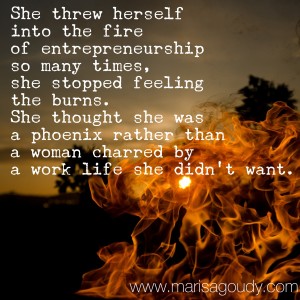 I threw myself into the fire of entrepreneurship so many times that I stopped feeling the burns. I convinced myself that I was a phoenix rather than a woman who had been charred to a crisp by a work life I didn’t want.
I threw myself into the fire of entrepreneurship so many times that I stopped feeling the burns. I convinced myself that I was a phoenix rather than a woman who had been charred to a crisp by a work life I didn’t want.
Rejecting “Entrepreneur” Isn’t Just Semantics
I have been misusing the “e” word, even though, deep down, I knew better.
Shame on me as a writer for being imprecise, but I think there’s a collective fog around the term.
“Mom entrepreneur,” for example. Surely that ubiquitous phrase contributes to the confusion since many in that club are freelancers or multi-level marketers or crafters selling their own wares.
Like so many, I started to throw that word around as if it just meant “earning a living & being your own boss” rather than “building an enterprise that can be scaled and sold.”
Everything felt true as I wrote it - I still stand by pieces like this one and this one. Apparently, as I talked about "entrepreneurship" I was thinking about the adventure of creating one’s own livelihood, not about the reality of venture capital.
But this is what I know to be true, and it goes beyond word choice:
When every day you spend as an entrepreneur is measured against some dream of growing beyond yourself when all you really want to do is be who you are, you’re poisoning yourself.
When you buy into that grand entrepreneurial mission and realize that it takes too much and still doesn’t feed your passions (or your family) but still push on anyway you are setting yourself up for failure.
Blah, Blah, Blah Personal Epiphany… Now What?
I am writing this post to explore this new self-knowledge. I am publishing it because I can’t seem to sit on this revelation because everything suddenly looks so different.
And I’m sharing it because I don't think I’m alone in this.
Right now, I am full of more questions than answers and more possibilities than anything else as I consider trading the “e” word for the “f” word.
No, Really, If Not Entrepreneurship, Then What?
If freelancing soothes the soul and fills the piggy bank (if not the corporate coffers), bring it on. I’m seeking “enough” right now. I’m seeking a way to bring in an income and exert my creativity.
Thing is, it may be time for me to stop trying so hard to tangle up the two. "Creative Entrepreneurship" sounds like such a delicious combination, but in practice, it's a dodgy mash up.
Freelancing. Finding a work-from-home J-O-B. Some other way to use my writing to pay the bills that I can’t even dare imagine yet... I’m staying open.
If I can take the money stress out of each day and if I can stop trying to leverage my creative output into something bigger than myself... that seems like how I need to nourish myself right now.
This Thursday afternoon I went straight for my emergency stash of kombucha. I knew I deserved the life enhancing nectar of that tea, something that resonated with hope and promise of self care - not nasty comfort calories.
Tell me I'm not alone in this.
I want to know if you’ve been starving parts of yourself thanks to the seductive soul crush of entrepreneurship - and whether it has been pushing you to your own unhealthy coping mechanisms, like Nutella on a spoon.
Is it time for you to feed yourself and the people you love from a just-the-right-sized container? I want to hear your stories… I think many bellies are rumbling with this truth. Is yours?
Why the Dalai Lama Can Simply Say “Be Kind” But You Can’t
 The Sovereign Standard, Issue 14
The Sovereign Standard, Issue 14
“Don’t worry, be happy, Sessa.”
 Whenever I was caught in the death spiral of preteen angst, that’s what my mom would say. She used that Bobby McFerrin line long after it faded from collective memory. In fact, I’m pretty sure she said that when I came to her with my working mother’s lament the weekend before she died so suddenly in the summer of 2009.
Whenever I was caught in the death spiral of preteen angst, that’s what my mom would say. She used that Bobby McFerrin line long after it faded from collective memory. In fact, I’m pretty sure she said that when I came to her with my working mother’s lament the weekend before she died so suddenly in the summer of 2009.
My mother was my best friend, and I treasured her wisdom (it went deeper than song lyrics, truly), but I always used to hate it when she said “don’t worry, be happy.” Maybe it was just because she was my mom. Maybe it was because I knew she had her own worries and I assumed that meant she didn’t have the authority to wave my troubles away with something as simple as happiness.
After all, I was contending with real, life-shattering drama (like a math test or whether I could quit my job and make it as a mom and an entrepreneur). She was dismissing my dilemma with a pop song. The indignity!
But I’m carrying on the tradition. Suddenly I find myself trying to soothe my five year old’s wild mood swings with the same exact medicine. In the midst of her kindergarten maelstrom, my daughter seems to find the proclamation just as irritating and meaningless as I did.
Thing is, I finally understand that my mom was right. When it comes to most daily stresses, “don’t worry, be happy” is perfect advice.
It may be perfect, but that doesn’t mean everyone qualified to give it.
Some People Have the Authority To Offer Crazy Simple Wisdom
“The purpose of our lives is to be happy.”
When the Dalai Lama says that, you sigh into the perfect clarity of that wisdom. You’re grateful that he stripped away all of the striving that we attach to material success and all of the ritual we drape over spiritual expression.
Happiness is a baby’s laugh. Happiness is a cat lolling about on a sun-warmed sidewalk. Happiness is a lover’s embrace. Happiness is it.
You believe him. We all believe this smiling bald man. Even if you don’t have a Buddhist bone your body, you feel there’s a truth in those words.
Most People are Just Wordsmithing
Now, what if some average looking person you didn’t know made a similar declaration? Not quoting some famous, trusted source, but just asserting something just as simple as “the purpose of our lives is to be happy?”
Most likely, you’d dismiss them as a dispenser of fortune cookie wisdom and proceed on, unmoved by their statement, still hungry for real, venerable truths.
Talk is cheap - especially when anyone with an internet connection can throw their ideas into countless online arenas. And yet, some people’s pronouncements just seem to be imbued with special meaning.
Why is it that Bobby McFerrin can craft a #1 hit and the Dalai Lama is revered as a sage for offering simple wisdom when most other people are dismissed for being too simplistic when they share a similar message?
People Are Listening for Something More: Devotion & Presence
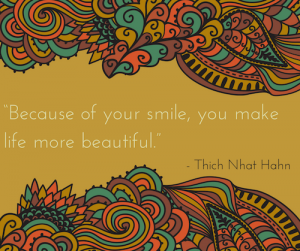 There’s a resonance in Thich Nhat Hahn’s, “Because of your smile, you make life more beautiful.”
There’s a resonance in Thich Nhat Hahn’s, “Because of your smile, you make life more beautiful.”
To be honest, you might also imagine that line gracing a Dove soap ad. We all have the same 26 letters to work with, after all. An advertising agency could easily churn out nice words that sound a lot like those from the man people call Thây (Vietnamese for teacher).
Regardless of how much market research goes into a tagline, it’s the resonance of time, depth, and awareness that really matters.
When that sentiment comes from a Zen Buddhist monk who Martin Luther King nominated for the Nobel Peace Prize, something much more profound ripples through to the reader. It’s an intangible quality, the essence of a truth that transcends the art of copywriting.
(I believe so much in this transmission of truth that comes from devotion and presence that I swore off being a writer-for-hire and now work as a writing coach, empowering you to discover your own story. More on that below…)
Devotion to Your Own Story Builds Your Presence as a Storyteller
The exemplary voices I am using in this piece belong to spiritual figures (from what I know about Bobby McFerrin, it isn’t a stretch to include him in such company). “Devotion” makes sense for them. Clearly the Dalai Lama and Thich Nhat Hahn built their stores of wisdom over decades of devoted practice.
But devotion is equally as important for us everyday folks leading secular lives. Especially when you’re the kind of person who knows she has a Bigger Story that wants to be told.
It’s not sexy or exciting in our “do it now” world to say that it takes a long, steadfast commitment to your work to become a credible authority, but it’s every bit as true as “The purpose of our lives is to be happy.”
You must explore your origins, your experiences, and your theories as assemble a Greater Story that conveys your signature magic and really connects with others.
Uncovering and telling your Greater Story takes time and focus. It takes devotion.
In time, you own your story so that people recognize the power of your message either in person or through the written word.
When the Greater Story Becomes the Sovereign Story
Through my own devotional process, I am working to understand the Greater Story as the Sovereign Story.
Thanks to much journaling, discussions with friends and colleagues, and by looking at all of life in the spirit of discovery, I’m figuring out how my small “s” stories can be woven into the Sovereign Story that I was born to tell.
Your own Sovereign Story could be a novel, a school of thought. a product, a memoir… In my case, my Sovereign Story is the exploration of Sovereignty itself. I’m called to help people uncover and tell their Sovereign Stories and to empower them to understand why that process to them as creatives and as entrepreneurs.
Devotions are often an arduous, knee-bruising pursuit. It feels more like labor than enlightenment most of the time, but I am watching the ripples of my Sovereign Story reach new shores thanks to every deeply considered piece I publish and every conversation I have with allies and prospects. I trust that my own presence is gathering around me like a cloak lovingly woven, row by row.
You and I don’t aspire to be to next Dalai Lama (the position won’t be available anyway), but we can devote ourselves to unlocking and sharing the story we were born to tell.
And we can aspire to something even more vital a noteworthy presence - the chance to stand sovereign in our own lives and the opportunity to share a Sovereign Story that makes others’ lives more beautiful, bearable, or bold.
Is it time to connect with your own Sovereign Story? I’d be honored to walk beside you on your journey.
Writing for the Web Is Crushing Your Creative Spirit
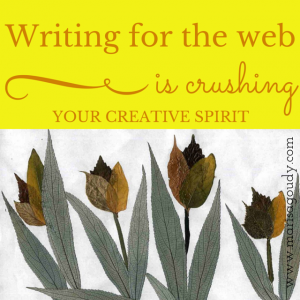 Last week, we explored how to take a story from your own life and shape it into a narrative that bolsters your visibility or furthers your business.
The goal is a simple one: connect to the reader through a description of a personal experience and then offer some useful or inspiring content that makes the reader the hero.
Last week, we explored how to take a story from your own life and shape it into a narrative that bolsters your visibility or furthers your business.
The goal is a simple one: connect to the reader through a description of a personal experience and then offer some useful or inspiring content that makes the reader the hero.
Essentially, invert that high school essay writing funnel: go from the narrow personal tale to the more universal message that speaks to the interests and concerns of your tribe.
I devoted two posts to this Art of Using Personal Stories In Professional Writing. One was a basic “how to” and the other was devoted to modeling the process.
Part of me hates that advice and part of me stands by it… because I am about to do it again.
Note: I’m defying the form I just offered you and inverting the “personal to universal” funnel. I may switch to another metaphor completely.
Since this post is about identifying and defying rules - as well as owning up to the pain of the online writing process and honoring the needs of your own creativity - funnel nixing and metaphor mixing seems acceptable.
But first, let’s establish some more rules - just so we can have the pleasure of breaking them. And so we can admit how we all feel a little broken by all these bloody rules.
Five “rules” for writing for the web
When you’re trying to follow typical internet writing conventions, you make sure that every web page or blog post is:
- Focused - Devote yourself to one central question or theme. Go deep rather than broad and realize that most of your big ideas are actually the foundation of dozens of different articles.
- Brief - This isn’t just about word count since important, “substantial” posts of 1500 - 3000 words can be highly successful. Be sure to break ideas into bite sized pieces so that the distracted reader can digest what you’re trying to say.
- Clear - Even if the goal is to raise questions for the reader rather than simply dole out a bunch of overly simplistic “shoulds,” don’t muddy the waters with your own ambivalence.
- Actionable - Every post should be the beginning of something - an ongoing relationship because the reader signed up for your list or the first step in the buying journey. You’re missing a huge opportunity if you don’t invite your reader to take a next step when they reach the end of the piece.
- Fascinating - Well, at least be interesting... The previous four rules are pretty irrelevant if you're boring the reader.
You and I will ignore those writing for the web rules (is that ok?)
Rules are made to be broken, of course, and you can point to a zillion successful articles that annihilate these conventions. Such posts compel you and even go viral because they’re aimed right at the collective sense of concern, outrage, or “awwww, so cute!”
One thing about those rule-breaking posts though? Readers may comment and share them, but they probably aren’t spending any money based on the content they've just consumed. It’s hard to invest in a writer or a company who rambles about their own confused state of affairs....
It’s important to remember - the “be focused, brief, clear, and actionable” aren’t just guidelines that exist “because the internet.” They’re just good business sense.
If “the confused mind does not buy,” then the confused entrepreneur does not attract buyers.
But what if you don’t feel focused and clear in your writing (or in your thinking)?
As I said, I kinda hate the advice I gave about using your personal stories to frame a bit of useful business information - but I believe in it enough to do it again (and again).
Telling you about my ambivalent, nuanced relationship with the blending of personal storytelling and forwarding a brand doesn’t make for focused, brief, clear, actionable prose. So, most of the time, I keep the existential angst to myself.
I tell part of my story about storytelling, hit publish and feel just good enough that I offered my readers something authentic and worthy of their time.
But then I stew. For days.
I fill a couple dozen journal pages, questioning the role of entrepreneurship and storytelling in my life. I analyze my place in the entire capitalist venture. I long to abandon business and blogging and all the well-meant advice so I can hole up with a word processor and a dream of being a novelist.
Ok, so I don’t do this every week (I’d end up in alone, likely in a van down by the river), but when I do get myself into this state, I write headlines like:
For I Will Go Mad If I Write Only for the Marketplace
I long to spool out meandering paragraphs that go on for pages, expecting the reader to stick with my muddled quest for clarity simply because she loves being along for the artist’s journey…
Invariably, I swing the other direction, glad that I’ve given up dead poets and all that opaque academic writing for the vibrant, immediate world of the creative entrepreneur.
I trust that there’s room in my life for the personal writing, the fiction writing, and the business writing.
I hate tangling my creativity in business goals and online writing rules. (Except when I don’t hate it.)
This, my friend, is not the stuff you blithely toss on the blog and share to LinkedIn with the expectation that new clients will start tying up the phone lines.
Why am I revealing all this anguish? Anguish I cooked up by publishing my own useful, business-focused blog posts? Because I think you’re going through something similar.
This writing-for-your-business stuff doesn’t always feel good. What’s the source of the pain?
Your writing process is often a burden or an unanswered "should." Let’s be honest about why all this blogging and guest posting and website content creation is hard - or even painful.
Here are 5 reasons that the creative entrepreneur resists the writing-for-your-business process (at least some of the time).
- Creativity doesn’t like serving a single-minded master - particularly when that master is concerned with doing what’s necessary to sustain a viable business
- Storytelling is an art in and of itself, and sometimes it feels like you’re selling out when you use your own stories to sell a product or service
- There’s only so much creative juice in your glass, and when you drain it for something as ephemeral as a blog post, you resent how the “real” creative projects suffer
- Certainty isn’t part of the creative journey - and you don’t want it to be… asserting your in-process vision as fact because the skimming online reader doesn’t see shades of gray feels reckless
- You want to believe that stories matter because they matter, not because they’re a means to an end
Some of these are pulled right from my own fevered journaling sessions. Others come from conversations I’ve had with creatives who struggle with their online writing chores. All of them resonate with me, but I think, collectively, we could go even deeper.
Please share your reasons for resisting or resenting the writing-for-your-business process in the comments or on your favorite social media post (please do tag me and share this post!)
Why wallow in "writing is hard!"?
We're not throwing a "woe is me, the connected creative with a business and a following and a commitment to my art" pity party here. Instead, we're owning up to our resistance and our periodic crises of faith in the whole endeavor of building an online platform.
In a world where ambivalence or being "in process" is seen as a weakness, we must take a stand for the very real state of "becoming" and embrace the clarity as well as the mess.
Dare to follow the rules of writing for the web - sometimes. Put out posts that are focused, brief, clear, actionable and tell enough of the story to meet your own Sovereign Standard.
Other days, allow yourself to defy those conventions and just write into "fascinating." Write what you must write, not what the marketplace seems to demand.
But, do me a favor - breathe deep and pause before hitting publish. Some ideas must be allowed to marinate in the mind and in the journal for a while... even if you are dedicated to making this whole online writing thing work.
Let's make this writing-for-your-business work easier... I'd love to support you as your writing coach. Have a look at what I offer and we'll set up a free 15 minutes chat about how I can help you.
